 Recently I wrote about a productivity principle I call, “Think 20%.”
Recently I wrote about a productivity principle I call, “Think 20%.”
It’s a strategy for focus to help you tame your whirlwind. It involves focusing your activities around the top 20% of things you need to do – those things that are most important, like key projects, goals and initiatives. What Stephen Covey called our “Big Rocks.”
But what about focusing your time?
If you identify your most important projects, goals and initiatives, but you don’t make time for them, nothing changes. You’re still trapped in the whirlwind of too much “stuff” to do and the feelings of exasperation, futility and stress that often come with it.
So…
Schedule Your 20%
You’ve probably heard about this. The key word is SCHEDULE.
Block time on your calendar to work on your Big Rocks.
Schedule appointments with yourself, and protect the time!
Like I said, you’ve probably heard this one. But do you DO this one? And if you do it, do you protect your time as well as you could? This idea takes discipline and practice. But it can also make you and your team powerfully productive.
The concept has a name. It’s called Time Blocking. And you can do it one of two ways.
Time-Block Your Week
Mary, the woman with the calendar below, has a pretty busy week filled with meetings and administrative tasks. But she also has a few Big Rocks to work on this week that are tied to her projects and initiatives.
She needs to prepare a budget, write a case study, and publish a new blog post.
We can learn from three subtleties in Mary’s weekly time-blocking approach.
- Pick no more than 1 to 3 Big Rocks each week. At any time, you probably have a handful of projects, initiatives and goals on your plate. But choosing too many of them to work on in a given week depletes your focus.
- Frame your time-blocks as “outputs.” A time-block of two hours may not be enough to finish an entire project. So ask yourself: What do I want to deliver or complete in this time-block? Draft budget. Write blog. Design template. Outline project plan. A defined output gives you a clear goal to work toward – and a concrete feeling of accomplishment when you hit it.
- Treat your time-blocks as commitments. Like any other meeting on your calendar, your time-blocks are commitments. By choosing your outputs and building time into your schedule to develop and deliver them, you are committing to getting them done. You are taking control of your whirlwind. Embrace that.
Time-Block Your Day
Cal Newport, a Georgetown University professor, is often credited for the term, “Time Blocking.” If Mary’s e-calendar approach is too much for you, take a page out of Cal’s playbook.
Cal’s approach is on paper. (Which is hilarious, given that Cal is a professor of computer science.)
Every evening, Cal consults his calendar and his weekly plan of tasks and responsibilities. He then plans his next day by blocking out chunks of time for the various things he wants to accomplish. This plan drives his work.
Here’s a sample of one of his daily pages pulled from Cal’s blog

Cal’s approach is organized and planful yet a little more free-flowing than Mary’s.
Notice that Cal doesn’t include every little detail on his plan. He uses some general terms to label certain time-blocks, such as “Deep Work.” (That’s Cal’s term for time set aside to focus, without distraction, on a cognitively demanding task. It’s also the title of his 2016 book Deep Work.)
None of It Works Without “No”
If you’re going to “Think 20%” about your activities and schedule your Big Rocks, then yes…sometimes that means you have to say…NO.
When people come to you for things – especially when the things they need are urgent to them but not important to you – you may need to say no. Or at least, you may need to negotiate.
You may need to say no to some meetings – or at least ask, “Can we tackle this in a short five-minute conversation…or by email?” In a way, that’s saying no. That’s protecting your time. And sometimes, you may even need to challenge or say no to your boss.
Leaders: You Need to Say NO for Your Team
If you lead a team, a project team, a department you are probably well aware of how organizations suffer from the whirlwind.
Organizationally (and individually, too) we need to continually and honestly evaluate our projects, processes and priorities to isolate those that are obsolete – and get rid of them. We need to clear out the old and outdated to make room for the new things that will really drive the team and the organization forward.
Less IS more. Focus is GOOD.
I know that saying no to people or to old projects or practices can be tough, but here’s the thing:
If we don’t learn to say no, we can’t say yes to our priorities.
Yes – It’s All About Planning
At this point, you might be thinking: “John, I’m so busy, I don’t have time for all this planning!”
I get it. The planning process itself takes time. And our plans are never perfect. Yet if we don’t plan, we’re putting ourselves at the mercy of the whirlwind.
Consider the words of Brian Tracy, from his wonderful book, “Eat That Frog!” (If you suffer from procrastination, as I do, read this book.)
Tracy contends: “Every minute spent in planning saves as many as ten minutes in execution.”
I agree. Plan your work, block your time, then work your plan.
Take control of your day…your week…your projects.
Because…if you don’t plan for and manage your time – someone else will.
At Living As A Leader, we offer a Leadership Development Series designed to produce leaders that can positively shape the cultural environment, reduce turnover and achieve crucial business initiatives. We do this by providing training, coaching and consulting with a focus on pragmatic communication tools for leaders at all levels of your organization.
For more information, check out our on-demand webinar or contact Steph Kotlarek at skotlarek@livingasaleader.com